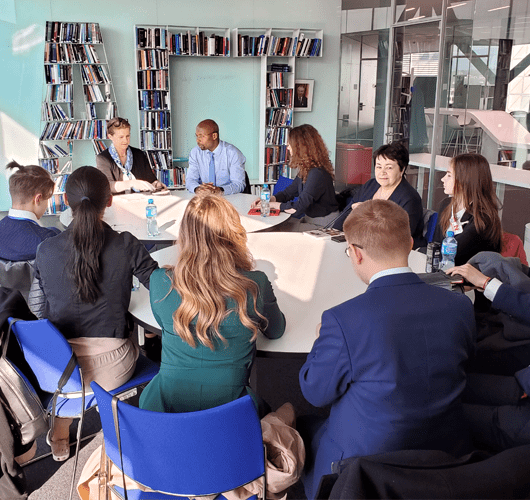SOLVE Context
Impact of Conflict on Children
 The impact of violence and conflicts on young people is one of the impediments to peace and security in the world. One area that has received insufficient attention is the impact of trauma experienced by children. Children encounter horrific scenes and conditions in times of armed conflicts and crisis situations.
The impact of violence and conflicts on young people is one of the impediments to peace and security in the world. One area that has received insufficient attention is the impact of trauma experienced by children. Children encounter horrific scenes and conditions in times of armed conflicts and crisis situations.
In a continental study (African Union, Study on the impact of conflict and crises on children in Africa) on the impact of conflict and crises on children in Africa conducted by the African Union, it was found that the desire for revenge among the children was observed. Worse still was the encouragement of revenge by the mothers. This demonstrates the vicious cycle of armed conflict, in which the victims may become violators themselves, making it extremely difficult to stop the conflict.
Every estimate of direct conflict deaths suggests that more than 90% of all casualties occur among young adult males (UNFPA, State of World Population 2015, p.21). Before the conflict in Syria, nearly every child was enrolled in primary school but by 2013 about 1.8 million children and adolescents were out of school. It took just two years of civil war to erase all education progress made since the start of the century. Today, some 50% of the 1.4 billion people living in countries impacted by crises and fragility are under the age of 20. (OECD report on States of Fragility, 2015). During conflict, weakened institutions, poverty and financial hardship leave adolescent girls vulnerable to abuse, exploitation, and violence (including risky livelihoods) (Women’s Refugee Commission, 2014). According to the United Nations High Commission for Refugees (UNHCR), there is a big gap within the humanitarian community at large in collecting data on youth affected by conflict (UNHCR, 2015).
International Context
The 2016 joint report entitled ‘Working Together for Peace: Synergies and Connectors for Implementing the 2015 UN Reviews’ (Joint report on Working Together for Peace: Synergies and Connectors for Implementing the 2015 UN Reviews) stressed that in a multi-stakeholder world, most threats to peace and security are driven from below and cannot be solved by governments alone. The state is a necessary but not a sufficient partner in this endeavor, particularly if it is weak, absent from certain parts of its territory, captured by elites, or not trusted by its people.
According to UNHCR, 68,5 million persons were forcefully displaced as a consequence of conflicts, violence and persecution at the end of 2017. UNDP Youth Strategy 2014-2017 (UNDP Youth Strategy 2014-2017) states that over 600 million youth live in fragile and conflict-affected countries and territories.
Realizing the above challenges, the international community, including the United Nations Children’s Fund, Non-governmental organizations such as Save the Children, and other humanitarian groups have taken action to address the impact of conflicts on children and help them build a better life.
On 9 December 2015, the United Nations Security Council adopted unanimously a historic and ground-breaking resolution on Youth, Peace and Security which recognizes that “young people play an important and positive role in the maintenance and promotion of international peace and security”. Resolution 2250 (UN Security Council Resolution 2250) was the first resolution fully dedicated to the important and positive role young women and men play in the maintenance and promotion of international peace and security.
The 2018 independent study (The missing peace) on youth, peace and security found that the work of young people on peace and security – across different phases of conflict, types of violence and regions of the world – is vital: if the right investments are made in the positive resilience of youth, and their peacebuilding work is recognized and nurtured, societies may reap a significant peace dividend. This study argues that this is the critical “missing peace”.
The study argues that realizing this peace dividend requires a commitment to ensuring that youth initiatives, organizations and individuals can operate in an environment that values and respects them, rather than one that controls or represses them. This can be achieved by providing the political, financial, legal and social means for optimizing and multiplying young people’s initiatives so that they may fully reach their potential to contribute to peace and security in their societies. Young women and men in general, and those investing in peace and the prevention of violence specifically, should be seen as indispensable allies in the quest for peace and security.
The study further makes the case that the prevention approach demands that governments and international organizations prioritize support for, and investment in, the positive resilience of the majority of young people, rather than exclusively reacting to the risk represented by just a few.
The study provided recommendations for societies and countries to fully harness and support the innovation of young people’s contributions to peace and to begin to work towards the ‘seismic’ changes. The following recommendations are relevant to iSCAN:
- Acknowledge and highlight the positive work of young women and men working on peace and security through the allocation of awards, grants and honours.
- Support the establishment or strengthening of national, regional and global youth peace networks – online and offline – for young people and their organizations to connect; organize for action; and exchange experiences, knowledge and resources.
- Prioritize capacity-building within their own organizations, for government employees and development aid professionals, by engaging young leaders and members of youth organizations in training and sensitization sessions on youth, peace and security.
- Strengthen the field of professionalized peace studies through interdisciplinary research and teaching curriculum at tertiary educational institutions, as well as through non-formal and informal educational initiatives, both online and
- Prioritize knowledge-sharing and exchange of information with youth organizations, community leaders and members of civil society to assist young people’s work on peace and security, enhance collaboration and eliminate overlap.
- Prioritize the creation of youth, peace and security coalitions to ensure a collective impact on youth, peace and security at local, national, regional and global levels. Such coalitions should be multisectoral and cross-cutting partnerships between young people; youth organizations; and multilateral, government and civil society actors, including the private sector, religious communities, private foundations and educational
- Prioritize opportunities for young refugees, internally displaced persons and migrants, and young people from host communities, to share their peace and security challenges through inter-generational dialogue and consultative forums, and to take part in decision-making processes to ensure that their needs are addressed.
SOLVE Initiative: Solution Oriented. Localized. Verified. Empowering
In recognition of the above, iSCAN is well positioned to contribute to ensuring that young people in conflict-affected settings and communities are empowered and put at the center of conflict prevention. Through its ‘Solve’ Initiative, iSCAN is building a community of high-impact young conflict solvers (Solvers) at the forefront of conflict prevention and maintenance and promotion of peace and security. Their work towards bringing about solutions are made possible by concerned members of the international community (Solve Enablers) with vested interest in eliminating violent conflicts and their impacts on young people. Solve is about finding solutions that are local, verifiable and measurable, and empowers the most affected members of communities. Solve is a community of people like you. People who aspire to go beyond making a change to creating solutions for global violent conflicts through learning, empowering, engaging and taking concrete actions. Solutions to end the impacts of violent conflicts on young people start with you. You are the “Solver” and the “Solve Enabler”.

